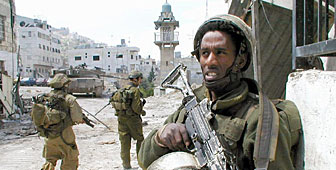Swiss policy shifts in Middle East

Switzerland's harder line toward Israel - twice summoning the Israeli ambassador to condemn military actions and considering economic sanctions - appears to signal a shift away from traditional neutrality in the Middle East.
The steps, driven by concern over alleged human rights abuses by Israel, demonstrate a new willingness by Switzerland to become a player in the international arena, and to apply pressure on Israel to pursue less damaging policies in the Occupied Territories.
This week, the Swiss cabinet approved a diplomatic initiative, calling on the Israelis and the Palestinians to abide by international humanitarian laws.
“We cannot be neutral when it comes to humanitarian principles,” Swiss Foreign Minister Joseph Deiss has said.
Evolving policy
With the emergence of regional conflicts such as that in Middle East, Swiss foreign policy has reflected a change from the ideal of non-involvement that prevailed as official policy during both World Wars.
“There has been a steady evolution in the definition the government has now of neutrality,” Peter Tschopp, director of the Graduate Institute of International Studies in Geneva, told swissinfo.
“Neutrality is no longer so much the myth it’s been during the post-war period, it’s now a foreign policy tool which is geared to make Switzerland an advocate for peace,” he said.
“It’s true that there is more activism on the part of Swiss government,” agreed Daniela Stoffel, a spokeswoman for the Foreign Ministry. “There has been a change in the global situation where Swiss neutrality has been reinterpreted but not substantially altered,” she told swissinfo.
Apparent legal violations
Switzerland has called Israel’s reoccupation of Palestinian-ruled territory an infringement of international law, and has challenged its pursuit of suspected Palestinian militants in the West Bank.
Switzerland is using its position as depositary state of the Geneva Conventions and home of the International Committee of the Red Cross (ICRC) to push both the Israelis and Palestinians to respect human rights.
Swiss officials have already held preliminary talks with the key actors – Israelis, the Palestinians and American diplomats – about its proposed peace initiative.
The Swiss have been particularly concerned about the indiscriminate use of force against civilians, the closure of the Palestinian territories and the blocking of medical and humanitarian aid, and has viewed these actions as contrary to the Geneva conventions.
The changing Swiss foreign policy accompanies the country’s investment of millions in development and humanitarian aid to the Palestinians. The Swiss Development and Cooperation Agency has helped finance a number of projects assisting the Palestinian refugees. Similar amounts have not been spent aiding Israeli civilians in the region.
Swiss pressure
In several strongly-worded statements, Switzerland has criticised the Israeli reoccupation of Palestinian-controlled towns and cities in the wake of last month’s Palestinian suicide bombing in Netanya, which killed 22 Israelis.
The Foreign Ministry has summoned Israeli ambassador Ygal Antebi, twice in as many months to demand that Israel withdraw its troops and tanks from the West Bank and Gaza Strip and release the Palestinian leader, Yasser Arafat, from his compound in Ramallah.
And the Swiss cabinet plans to assess Switzerland’s economic and military ties with Israel this week.
Israeli reaction
The evolving Swiss policy spurred a swift response from Israel this week, as Ambassador Antebi rejected the Swiss condemnation of Israeli military action in the Occupied Territories.
The negative Israeli reaction prompted Deiss to reassure Switzerland’s Jewish community that Bern had not begun to favour the Palestinians.
“I share your suffering when a [suicide] attack inflicts a heavy death toll on your civilian population,” Deiss said.
But some in the Swiss Jewish community remained unconvinced.
“The position of the Swiss government is not balanced enough,” Sigi Feigel, honorary president of Switzerland’s Jewish community in Zurich, told swissinfo.
“Israel has been criticised disproportionately heavily,” he said.
by Samantha Tonkin

In compliance with the JTI standards
More: SWI swissinfo.ch certified by the Journalism Trust Initiative
You can find an overview of ongoing debates with our journalists here . Please join us!
If you want to start a conversation about a topic raised in this article or want to report factual errors, email us at english@swissinfo.ch.